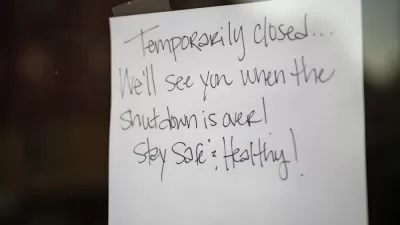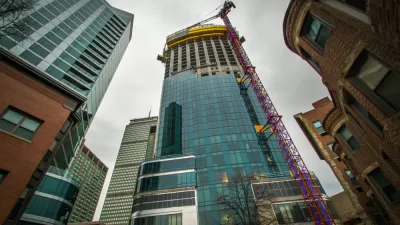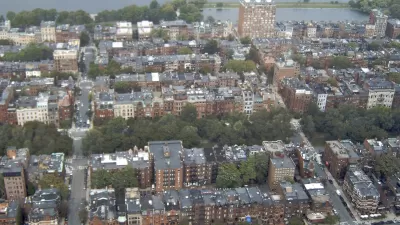Better architecture has been a consistent theme of the tenure of Boston Mayor Marty Walsh. The city's first comprehensive plan since 1965 could be the key tool in producing the desired results.
Dante Ramos writes an op-ed describing, and responding to, the emerging planning agenda for Boston Mayor Marty Walsh. Among the largest of those initiatives is the launch of Imagine Boston 2030, the city's first comprehensive planning process in 50 years.
In a separate Catherine Carlock reports the early details of Imagine Boston 2030, which so far has set the following timetable for planning and adoption:
"The Imagine Boston 2030 website outlines a six-phase timeline for the planning process: establishing baseline conditions this summer and fall; setting visions, principles and goals by this fall; drafting a formal blueprint by spring 2016; determining content development throughout the winter and spring of 2016; drafting recommendations to the mayor by late 2016 and into 2017 and a final plan adoption by summer 2017."
As noted by Ramos, Mayor Walsh announced the Imagine Boston 2030 process at the Innovative Design Alternatives Summit event earlier in May. The theme of the event follows earlier announcements by Mayor Walsh that called for better architecture in the city.
Ramos's article also includes commentary on the likelihood of Boston improving its planning process and its architectural outcomes—according to Ramos, the two go hand and hand. "Alas, architects can’t fix what ails Boston architecture. Only the mayor can," writes Ramos. "Walsh’s master plan could help. If it reduces risks by setting clear, reasonable parameters for what developers can do without seeking an indulgence from the city, they may take chances on new architects and new ideas."
FULL STORY: Mayor Walsh finds his urban-planning vision

Maui's Vacation Rental Debate Turns Ugly
Verbal attacks, misinformation campaigns and fistfights plague a high-stakes debate to convert thousands of vacation rentals into long-term housing.

Planetizen Federal Action Tracker
A weekly monitor of how Trump’s orders and actions are impacting planners and planning in America.

In Urban Planning, AI Prompting Could be the New Design Thinking
Creativity has long been key to great urban design. What if we see AI as our new creative partner?

King County Supportive Housing Program Offers Hope for Unhoused Residents
The county is taking a ‘Housing First’ approach that prioritizes getting people into housing, then offering wraparound supportive services.

Researchers Use AI to Get Clearer Picture of US Housing
Analysts are using artificial intelligence to supercharge their research by allowing them to comb through data faster. Though these AI tools can be error prone, they save time and housing researchers are optimistic about the future.

Making Shared Micromobility More Inclusive
Cities and shared mobility system operators can do more to include people with disabilities in planning and operations, per a new report.
Urban Design for Planners 1: Software Tools
This six-course series explores essential urban design concepts using open source software and equips planners with the tools they need to participate fully in the urban design process.
Planning for Universal Design
Learn the tools for implementing Universal Design in planning regulations.
planning NEXT
Appalachian Highlands Housing Partners
Mpact (founded as Rail~Volution)
City of Camden Redevelopment Agency
City of Astoria
City of Portland
City of Laramie





























